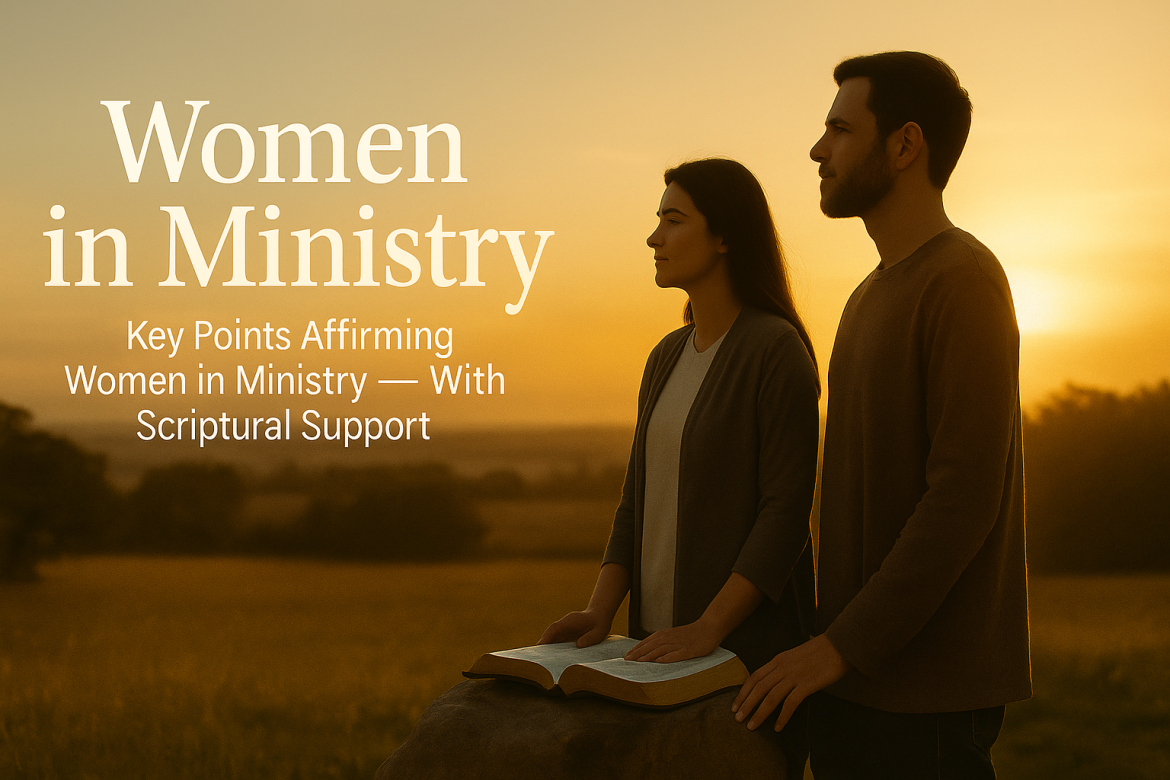Key Points Affirming Women in Ministry — With Scriptural Support
The following article summarizes key biblical and theological points discussed by Doug Clay, General Superintendent of the Assemblies of God, and Dr. Alan Tennyson, Theological Counsel for the Assemblies of God, during a Theology Matters segment on women in ministry. The principles they share are not opinions or cultural trends but truths verified through Scripture, showing that the Holy Spirit calls and empowers both men and women for every form of service in Christ’s Church.
Five Things We Will Learn
- That both men and women were created in God’s image to share His purpose, authority, and calling.
- That Scripture—from Genesis to Acts—reveals women serving as prophets, judges, deacons, and teachers.
- That misunderstood passages in Paul’s letters address order and domination, not gender-based restriction.
- That the outpouring of the Holy Spirit empowers both sons and daughters equally for ministry.
- That affirming women in ministry reflects the fullness of Christ’s body and honors the Spirit’s call to all believers.
1. God Created Men and Women to Share His Image and Authority
Genesis 1:26–28; Genesis 2:18
Male and female were both created in the image of God, equally reflecting His nature and sharing His delegated authority over creation.
Adam and Eve were co-workers in the garden, commissioned together to rule and steward the earth.
Inequality entered only after the Fall (Genesis 3:16), not before. In God’s original design, man and woman stood side by side in purpose and dignity.
2. Women Held Leadership and Prophetic Roles Throughout Scripture
Old Testament Examples:
- Miriam — prophet and worship leader with Moses and Aaron (Exodus 15:20–21).
- Deborah — judge, prophet, and national leader (Judges 4–5).
- Huldah — prophetess whose counsel guided King Josiah’s reform (2 Kings 22:14–20).
These examples demonstrate that God Himself called and appointed women to lead, speak, and represent His authority among His people.
3. The Outpouring of the Holy Spirit Empowers All Believers Equally
Joel 2:28–29; Acts 2:17–18; Acts 21:8–9
Joel prophesied, “Your sons and daughters will prophesy.”
Peter affirmed at Pentecost that this promise was fulfilled — the Spirit empowers both men and women to proclaim God’s truth.
Philip’s four daughters are specifically called prophets, showing the continuation of this gift in the New Testament.
The Holy Spirit makes no distinction in gender when distributing gifts, since “to each one the manifestation of the Spirit is given for the common good” (1 Corinthians 12:7).
4. Women Served in Leadership and Ministry Roles in the New Testament
Examples:
- Junia — “outstanding among the apostles” (Romans 16:7).
- Phoebe — a deacon and trusted leader who delivered Paul’s letter to the Romans (Romans 16:1–2).
- Priscilla — co-taught with her husband Aquila, instructing Apollos in the way of God (Acts 18:26).
- Lydia — successful businesswoman and host of a house church in Philippi (Acts 16:14–15, 40).
- Chloe — mentioned as head of her household, likely hosting a church (1 Corinthians 1:11).
From evangelism and teaching to hosting and oversight, the early church recognized and affirmed women’s leadership in ministry.
5. Misunderstood Texts Address Order and Context, Not Restriction of Women
A. 1 Corinthians 14:34–35 — Order in Worship
Paul’s instruction that “women should remain silent in the churches” cannot mean total silence, since he already affirms women praying and prophesying publicly (1 Corinthians 11:5).
The issue addressed was disruption and disorder—wives publicly questioning or debating their husbands during services.
The Greek term for “ask” means to interrogate; Paul instructs that such discussions take place privately “at home,” not during communal worship.
His concern was not gender, but orderly worship: “For God is not a God of disorder but of peace.” (1 Corinthians 14:33)
B. 1 Timothy 2:11–15 — Correction of False Teaching in Ephesus
Paul’s letter to Timothy addresses a local crisis of false teaching in Ephesus, a city dominated by the cult of Artemis.
The command that a woman “must not teach or have authority over a man” uses the Greek word authentein, meaning to dominate or usurp authority—not ordinary spiritual leadership.
Paul’s emphasis: women must learn (a radical affirmation in that culture) and do so with a teachable, calm spirit—not in a domineering or contentious way.
The restriction is situational, dealing with false teachers and cultural confusion, not a universal rule for all churches.
Paul affirms women teaching, prophesying, and leading elsewhere, so this passage cannot mean total prohibition.
C. No Domination: Paul Corrects the Misuse of a Gift, Not the Misuse of a Gender
1 Timothy 2:11–12; 1 Corinthians 14:34–35
1 Timothy 2:12 — “to have authority” = authentein. Paul’s instruction forbids domineering or usurping behavior, not genuine Spirit-led leadership.
“A woman must not teach in order to dominate a man.”
In marriage: A wife should never use teaching, prophecy, or ministry to dominate her husband.
In the church: Women should not use ministry to dominate men—and likewise, men should not dominate women.
Jesus modeled true leadership as servanthood, not control.
Mark 10:42–45 — “Whoever wants to become great among you must be your servant.”
1 Corinthians 14:34–35 — Order, Not Exclusion
The problem in Corinth was not women speaking but wives interrupting or disputing with their husbands during prophetic evaluation.
Paul’s solution: Handle disagreements privately at home, maintaining unity in worship.
His goal: Keep worship peaceful, not contentious.
1 Corinthians 14:33 — “For God is not a God of disorder but of peace.”
Dr. Tennyson’s summary: Paul is correcting the misuse of a gift, not the misuse of a gender. His concern is mutual honor, peace, and the unhindered work of the Holy Spirit.
Why this matters:
- Preserves healthy order in worship — 1 Corinthians 14:39–40
- Safeguards mutual honor in marriage — Ephesians 5:21, 25
- Reinforces servant leadership — Mark 10:42–45
- Protects Spirit-led ministry for all — Galatians 3:28; 1 Corinthians 12:4–7
6. The Church’s Historical Limitation of Women Was Cultural, Not Scriptural
Early Christian communities featured women leaders, prophets, and deacons.
As the church became more institutionalized (2nd–3rd century), culture—not Scripture—imposed male-only structures.
Protestant reformers reclaimed sola scriptura*, restoring Scripture’s authority over tradition.
Pentecostals continued this biblical recovery, affirming that the Spirit calls whomever He wills, regardless of gender.
- *Sola scriptura means that Scripture alone is authoritative for the faith and practice of the Christian. The Bible is complete, authoritative, and true. “All Scripture is God-breathed and is useful for teaching, rebuking, correcting and training in righteousness” (2 Timothy 3:16).
Related:
7. The Pentecostal and Assemblies of God Position
Acts 2:17–18; 1 Corinthians 12:4–7; Galatians 3:28
The Assemblies of God has affirmed from its founding that any woman can be called to any ministry role—from evangelist to pastor, from missionary to superintendent.
“Your sons and your daughters will prophesy.” (Acts 2:17)
To restrict women from leadership is to limit the work of the Holy Spirit and to deny part of Christ’s provision for His Church.
When both men and women respond to God’s call, the Church reflects the fullness of Christ’s body and advances His mission.
8. The Theology of Women in Ministry Is a Theology of the Whole Church
Galatians 3:28; 1 Corinthians 12:12–27
Ministry is not about gender—it’s about obedience to the call and gifting of the Holy Spirit.
The health of the Church depends on both men and women fully functioning in their God-given callings.
Restricting women based on gender distorts the biblical vision of the Church as a unified, Spirit-filled body.
True leadership is servanthood, not dominance—a reflection of Jesus Himself (Mark 10:45).
Summary Statement
God’s call to ministry is determined by His Spirit, not by gender. From Genesis to Revelation, Scripture reveals women leading, teaching, prophesying, and serving in every sphere of God’s Kingdom.
The outpouring of the Holy Spirit fulfills Joel’s prophecy—sons and daughters together proclaim the Word of the Lord.
To silence or restrict women’s ministry is to silence the Spirit’s voice. But when men and women alike respond to His call, the Church walks in the fullness of Christ’s mission and power.




